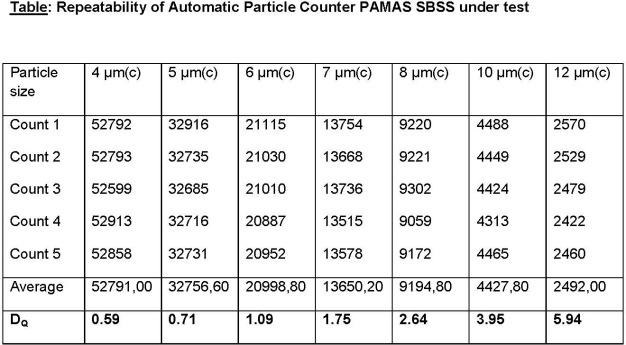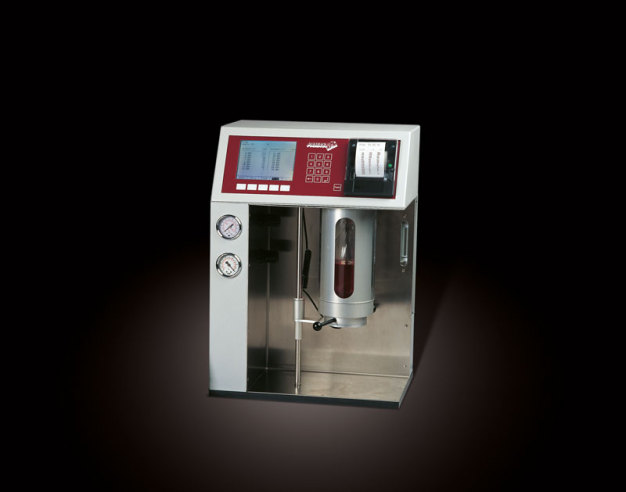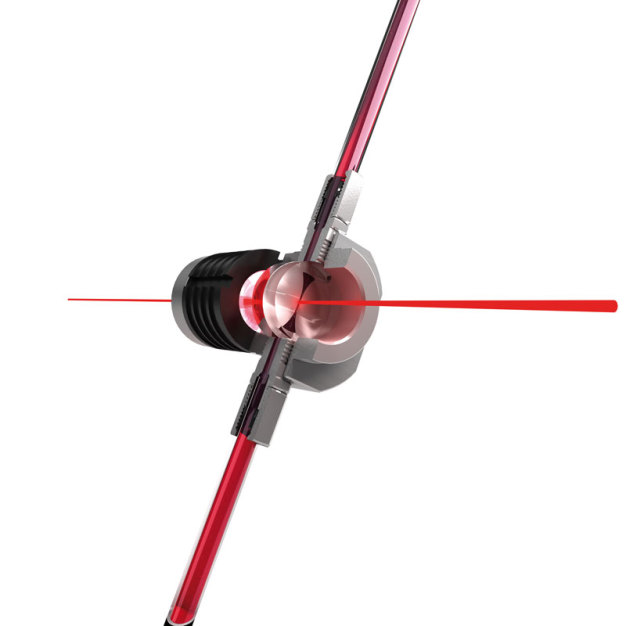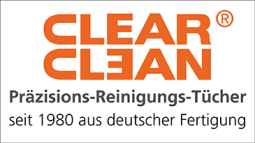Reproducible measuring results: PAMAS SBSS – Tried and trusted reference instrument for laboratory particle counting
The PAMAS SBSS particle analysing system is a tried and trusted consistent measuring instrument for laboratory particle counting. Using measuring data provided by fluid samples with known particulate contaminant, Pamas has proved the repeatability of its particle counting systems. The evaluations of these measurements clearly show that the results of different measurements of the same fluid sample scarcely deviate from one to the next. Many renowned laboratories appreciate the extremely high measuring accuracy of Pamas particle counters and in turn, manufacturers of conventional particle counters use the PAMAS SBSS particle analysing system as a reference for their calibration.
The repeatability of a particle counter is an important parameter to define the performance of a system. Fluid cleanliness, control of water, oil, hydraulic liquids and pharmaceutical suspensions require an accurate indication of particulate matter. Been a specialist in fluid particle counting, Pamas develops, manufactures and sells particle analysing instruments for batch and online sampling and for field measurements on-site. For batch sampling of higher viscosity fluids, the company recommends the PAMAS SBSS particle analysing system.
Automatic Particle Counters (APC) are used for contamination control to determine the size distribution and concentration of particulate matter in fluids. Initial calibration assures the particle counters’ measuring accuracy. By defining a standardised procedure for the calibration of Automatic Particle Counters, the international calibration standard ISO 11171 guarantees the exact determination of the particle size distribution in liquids.
The ISO 11171 calibration standard contains some repeatability statements. All ISO 11171 compatible systems need to fulfill these requirements to ensure they adhere to the standard. ISO 11171 defines the repeatability requirements through the DQ value (DQ standing for Difference in Quantity). So the DQ parameter determines the repeatability of APC measuring results. The DQ value is calculated by the formula: DQ = 100*((max-min)/mean count). For all measurements with more than 10.000 counts per size channel, the DQ value is limited to 11% (+/- 5.5%). The limit increases for samples with lower counts. At 100 counts per measurement, the permitted DQ value is 27.5% (+/- 13.75%).
Using measuring data provided by fluid samples with known particulate contaminant, Pamas has tested the repeatability of the PAMAS SBSS laboratory particle counting system. To calculate the DQ value, a hydraulic oil sample has been measured five times after previous standardised sample preparation. The particles were counted in the size channels > 4 µm(c), > 5 µm(c), > 6 µm(c), >7 µm(c), > 8 µm(c), > 10 µm(c) and > 12 µm(c). The particle counts of all five measurements then were compared in each size channel.
The test resulted in DQ values between 0.59% and 5.94%. The test results thus were far below the maximum DQ limit of 11%. For the particle size > 4 µm(c), the DQ value was 0.59%: this corresponds to only 54 ‰ of the maximum DQ limit as determined by ISO 11171. The test clearly defined the high measuring accuracy and supreme repeatability of the PAMAS SBSS particle analysing system.
Due to its supreme measuring accuracy and repeatability, the PAMAS SBSS is used as the reference instrument in renowned laboratories. Manufacturers of conventional particle counting systems appreciate the tried and trusted Pamas particle counters and use them as a reliable reference to calibrate their systems.
Besides its measuring accuracy, the PAMAS SBSS laboratory particle counting system further excels due to its ease of use: Equipped with an integrated pre-adjustable sampling mode, the system analyses the sample directly out of the sample container, thus removing the need for the fluid sample to be transferred to another container before measurement which may falsify results due to cross contamination. Once the instrument is set up to the user specified parameters, the PAMAS SBSS’s operation is reduced to a one button press combined with the insertion of the fluid samples wishing to be analysed.
Another benefit of the PAMAS SBSS laboratory instrument is the integrated pressure container. This sample vessel is used to create either high pressure or vacuum. High pressure is applied to transport high viscous liquids through the sensor for measurement whereas the vacuum mode removes gas bubbles out of the sample.
This user-friendly laboratory instrument offers full flexibility as virtually all measuring parameters can be pre-set and adapted to the specific application by the user.
PAMAS Partikelmess- und Analysesysteme GmbH
71277 Rutesheim
Germany











